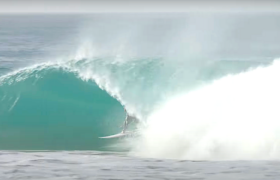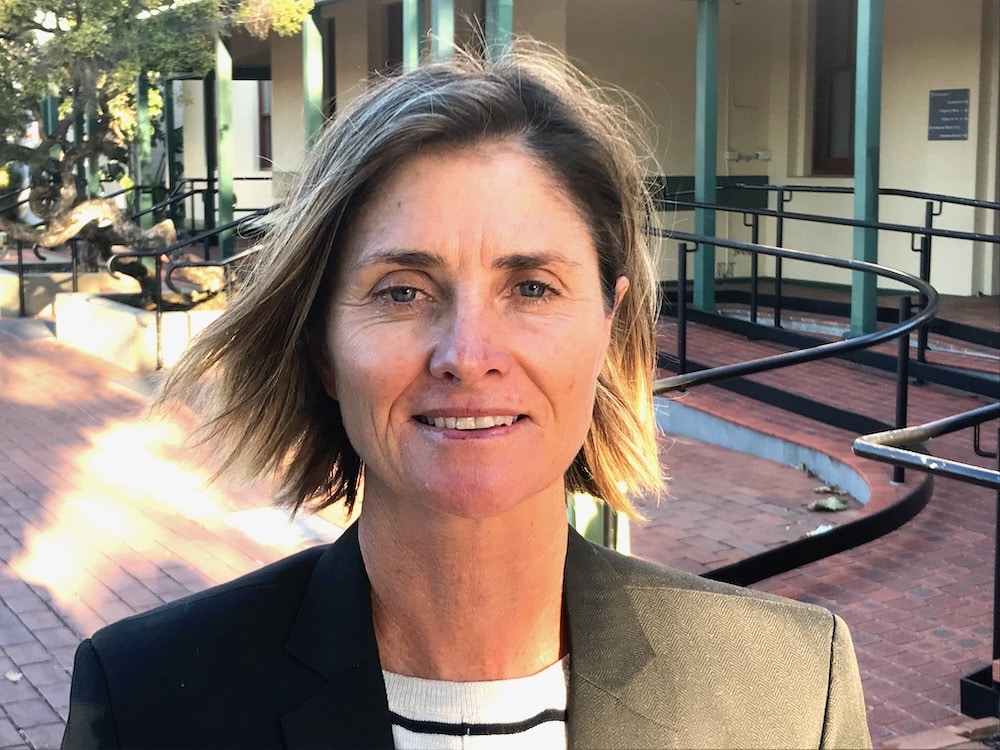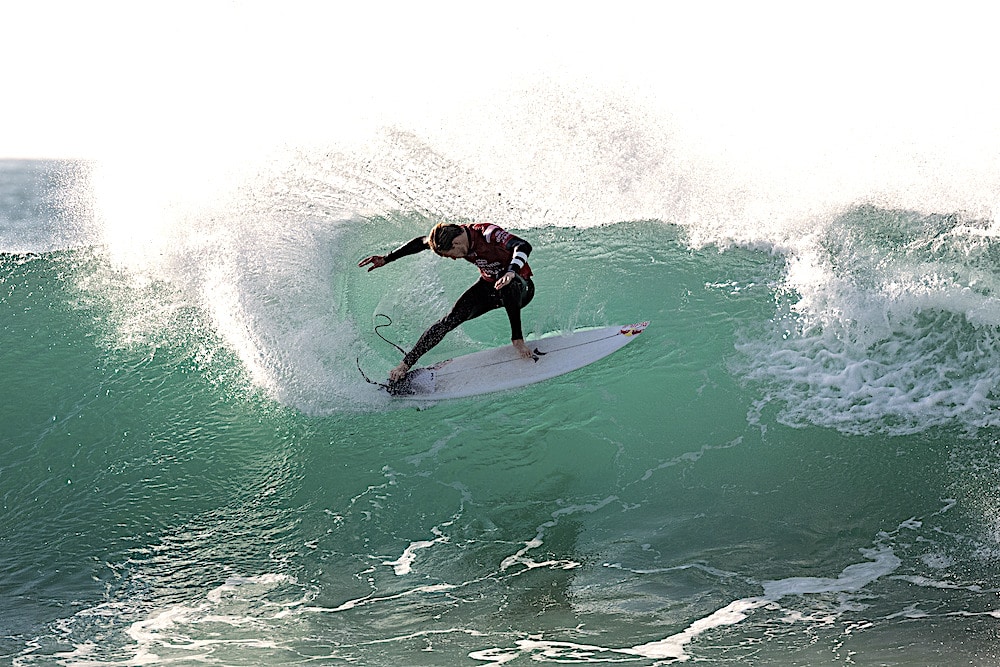Three-time world champ beats Lakey Peterson at biggish, windy Jeffreys Bay…
Last year I sat across the table from Carissa Moore in a rented camper van parked in the driveway of a Ventura duplex. She told me how after she’d struggled to match her early successes.
She’d been called the next Kelly Slater after winning her first world title at age 19. Then she’d lost her way in a sport she’d been set to dominate. After an early round defeat at Huntington Beach in 2017, she’d flown back to Hawaii uncertain if she really wanted to continue competing at all.
That’s all behind her now.
After beating a ripping Lakey Peterson in the finals at J-Bay, Moore has won her first event of the year and taken over the lead in the world rankings. It’s been four years since Moore last won a world title, but this season, she’s made the quarterfinals at each event. In tears after the final, Moore said, she just kept wondering when the event win would come.
At J-Bay, it finally did.
Moore did not have an easy route to this final. In the semifinals she faced down teen wonder Caroline Marks, whose career trajectory in some ways resembles Moore’s own. Early success. Brilliant talent.
Overnight, a new swell had filled in and with it, came the wind, which cut spines into the wave’s faces. Spray flew skyward. The conditions looked tricky and both women started slowly, feeling out the swell and looking for the right waves.
Moore found her first good score with a six. She looked controlled, but not pushing as hard as she might. It was a good start, but you don’t beat Caroline Marks with sixes. Just ask Steph Gilmore.
During the quarterfinals, Marks thrived on the fast-moving walls that smaller J-Bay offers. On finals day, the trickier lineup with its big, wind-blown sections looked to shift the advantage to Moore.
While Marks showed her trademark smooth railwork and vertical turns, she got more often got caught behind the sections. The long, connected strings of turns she needed proved harder to come by. On a big close-out move that might have won her the heat, Marks mistimed it and fell.
Moore, meanwhile, steadily worked into the heat. She looked confident and patient, placing her turns carefully, reading the wave to perfection. A smooth set of turns netted her an 8.33.
From the commentary booth, Sally Fitzgibbons suggested that Moore was holding something back, that she still had more powerful surfing in her. As it turned out, she didn’t need it against Marks, who could only muster a pair of sixes.
By beating Marks, Moore took over the lead in the rankings. When Rosy Hodge asked her about the rankings, Moore said that was the big picture and it wasn’t at the front of her mind. Moore wanted the event win more than anything.
The semifinal between Lakey Peterson and Malia Manuel offered a study in contrasts. Manuel brought her characteristically smooth, controlled style, while Peterson threw down dynamic, fast moving turns. Manuel put an early six on the board, but her turns lacked the power that Peterson routinely brings to her surfing. Peterson threw down a pair of sevens and pushed through to the final.
What a nailbiter this final turned out to be.
The commentary team unanimously picked Peterson to win. I wasn’t so sure, after seeing Moore’s eight-point ride against Marks. Either way, the two started the heat uniquely well-matched. The bigger waves smoothed out Peterson’s style and gave her surfing a polish it lacked in the quarters. Moore brought the same calm approach that had delivered her to that moment.
Peterson took an early lead and looked unbeatable. Moore looked at multiple waves without finding what she wanted. With the long paddle out, it made sense to be picky. Then Moore strung together a series of tight turns and punctuated it with a slamming layback. It was a beautifully surfed wave with a perfect finish. The judges threw an eight and Moore took the lead.
Peterson now needed a 7.47. Not easy, but not impossible either.
On her next wave, with thirteen minutes to go, Peterson threw two turns, and pulled into a massive barrel. If she’d made it through, that might have ended the heat right then and there.
She didn’t.
Moore meanwhile found a backup score, a 6.90, thanks to two solid turns. Though she got stuffed in the barrel, her turns were enough to give her a score.
Now Peterson needed an 8.21.
Quite suddenly, the Californian’s task had become impossible. Inside six minutes to go, Peterson found a screamer and surfed the hell out of it, but it wasn’t enough.
As she paddled back out, the clock ticked down to nothing.
On her final wave, Moore stood tall, riding the highline, that wondrous feeling, weightless. She’d done it, defeating Peterson, everyone’s favorite to win this final.
And at last, she’d found the win that had eluded her so far this season.
After the uncertainties of the past few years, Moore looks happy to be where she is. She’s made her decision. She wants to be right here, chasing world titles, and she’s ready to roll with the results, both good and bad.
She’s learned resilience and when an athlete in any sport manages that difficult lesson, they emerge stronger and much more difficult to defeat than they ever were before.
If Moore won early in her career on talent alone, now she’s married that talent to a renewed focus and a rock-solid determination.
The door to a fourth world title has now swung open for her.
J-Bay Women’s Final Results:
1 – Carissa Moore (HAW) 15.47
2 – Lakey Peterson (USA) 14.60
Women’s Semifinal Results:
Heat 1: Carissa Moore (HAW) 14.33 DEF. Caroline Marks (USA) 12.67
Heat 2: Lakey Peterson (USA) 15.27 DEF. Malia Manuel (HAW) 11.00
2019 Women’s CT Jeep Leaderboard (following Corona Open J-Bay):
1 – Carissa Moore (HAW) 41,175 pts
2 – Sally Fitzgibbons (AUS) 37,325 pts
3 – Stephanie Gilmore (AUS) 35,065 pts
4 – Lakey Peterson (USA) 33,850 pts
5 – Caroline Marks (USA) 32,135 pts





